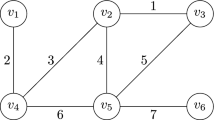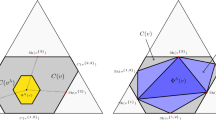Summary
In the sequel we will derive sufficient and necessary conditions for the existence of certain numeric representations of simple games. In § 2 the above mentioned representation is given by a so called, “coalitionally ordered function”, i.e. a numeric function representing the desirability of each coalition in the class of all coalitions. Simple games which possess a c.o.f are called coalitionally ordered games. Sufficient and necessary criteria are given for a simple game to be a c.o.g. Analogously weighted majority games are characterized in § 3. The criteria to be presented are linked by properties of the desirability relation of a simple game. The concept of a desirability relation was introduced by Peleg 1978.
Zusammenfassung
Im folgenden werden wir hinreichende und notwendige Bedingungen zur Existenz von gewissen numerischen Darstellungen einfacher Spiele (simple games) herleiten. Diese oben genannte Darstellung wird in § 2 durch eine sogenannte “coalitionally ordered function”, gegeben, wobei wir darunter eine numerische Funktion verstehen, die die “Desirability”, jeder Koalition innerhalb der Klasse aller Koalitionen beschreibt. Einfache Spiele, die eine c.o.f besitzen, werden “coalitionally ordered games” genannt. Es werden hinreichende und notwendige Bedingungen dafür genannt, daß ein einfaches Spiel ein c.o.g ist. Analog werden gewichtete Abstimmungsspiele (weighted majority games) in § 3 charakterisiert. Die angegebenen Kriterien werden mit Eigenschaften der sogenannten “desirability relation” eines einfachen Spieles in Verbindung gebracht. Das Konzept einer “desirability relation” wurde von Peleg 1978 verwendet.
Similar content being viewed by others
References
Adams W (1965) Elements of a theory of inexact measurement. Philosophy of Science 32:205
Fishburn PC (1970) Utility theory for decision making. John Wiley
De Swaan A (1973) Coalition theorems and cabinet formations. Elsevier Scientific Publishing Company, Amsterdam
Einy E A note on the Des. Rel. of S. G. Inst. of Math., Hebrew University, Jerusalem
Kraft C, Pratt W, Seidenberg A (1959) Intuitive probability on finite sets. Ann Math Statistics 30:408–419
Neumaier A (1975) Inklusions -und Abstimmungssysteme. Math Z 141:137–158
Peleg B (1978) A theory of coalition formation in committees. Journal of Mathem Economics
Peleg B (1981) Coalition formation in simple games with dominant players. Int Journal of Game Theory 10:11–23
Scott D (1964) Measurement structures and linear inequalities. Journal of Mathematical Psychology 1:233–247
Shapley LS (1964) Solutions of compound simple games. In: Dresher M, Shapley LS, Tucker AW (eds) Advances in game theory. Princeton
Steiner H-G (1982) Eine gemeinsame Charakterisierung der Additivität auf endlichen Booleschen Verbänden und der Meßbarkeit von Abstimmungsgebilden. Mathematische Semesterberichte 1
Author information
Authors and Affiliations
Rights and permissions
About this article
Cite this article
Meister, G. Characterization of coalitionally ordered games. Zeitschrift für Operations Research 31, A189–A209 (1987). https://doi.org/10.1007/BF02109597
Received:
Revised:
Issue Date:
DOI: https://doi.org/10.1007/BF02109597




